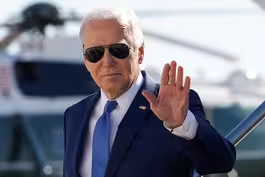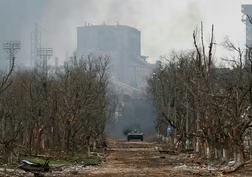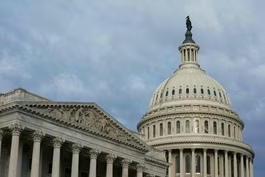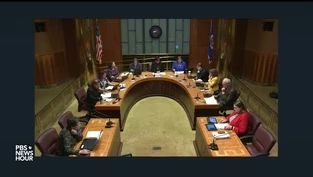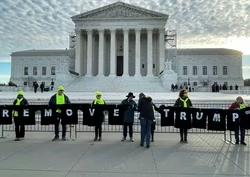
February 8, 2024 - PBS NewsHour full episode
2/8/2024 | 57m 46sVideo has Closed Captions
February 8, 2024 - PBS NewsHour full episode
Thursday on the NewsHour, Supreme Court justices appear to side with Donald Trump over Colorado's attempt to remove him from the state's primary ballot. The Justice Department says President Biden willfully withheld classified documents but it will not seek charges. Plus, a new report details the destruction of the Ukrainian city of Mariupol and accuses Russian forces of war crimes.
Problems playing video? | Closed Captioning Feedback
Problems playing video? | Closed Captioning Feedback
Major corporate funding for the PBS News Hour is provided by BDO, BNSF, Consumer Cellular, American Cruise Lines, and Raymond James. Funding for the PBS NewsHour Weekend is provided by...

February 8, 2024 - PBS NewsHour full episode
2/8/2024 | 57m 46sVideo has Closed Captions
Thursday on the NewsHour, Supreme Court justices appear to side with Donald Trump over Colorado's attempt to remove him from the state's primary ballot. The Justice Department says President Biden willfully withheld classified documents but it will not seek charges. Plus, a new report details the destruction of the Ukrainian city of Mariupol and accuses Russian forces of war crimes.
Problems playing video? | Closed Captioning Feedback
How to Watch PBS News Hour
PBS News Hour is available to stream on pbs.org and the free PBS App, available on iPhone, Apple TV, Android TV, Android smartphones, Amazon Fire TV, Amazon Fire Tablet, Roku, Samsung Smart TV, and Vizio.
Providing Support for PBS.org
Learn Moreabout PBS online sponsorshipAMNA NAWAZ: Good evening.
I'm Amna Nawaz.
GEOFF BENNETT: And I'm Geoff Benn On the "NewsHour" toni about whether Colorado can bar former President Donald Trump from the state's primary ballot.
AMNA NAWAZ: The Justice Department says President Biden willfully withheld classified documents, but will not seek charges.
GEOFF BENNETT: And a new report and accuses Russian forces of war crimes.
IDA SAWYER, Human Rights Watch: This operation of Russia's full-scale invasion of Ukraine so far.
(BREAK) AMNA NAWAZ: Welcome to the "NewsHour."
The Justice Department has Obama era documents which were found in his former office in Washington, D.C., and at his home in Delaware.
GEOFF BENNET that no criminal charges are warranted in this matter."
President Biden offered his first public comments about the report earlier this evenin JOE BIDEN, President of the United States: The special counsel acknowledged I c completely, I did not throw up any roadblocks, I sought no delays.
In fact, I was so determined to get the special counsel what they needed, I a five-hour in-person interview over the two days of October the 9th -- 8th and 9th last year, even though Israel had just been attacked by Hamas on the 7th.
I was especially pleased to see the special counsel make clear the stark differen this case and Donald Trump.
The bottom line is, the special an y charges.
And this mat GEOFF BENNETT: Let's bri special counsel at the Pentagon.
Thank you for being with us.
So this investigation fo after finishing his term as vice president and that he had shared sensitive information with a ghostwriter who helped him with his 2017 memoir.
The president isn't facing charges in what would typically be considered a felony.
Does this outcome comport with the facts and evidence in the case?
OONA HATHAWAY, Yale Law School: I think it does.
I mean, I think that this report is sort of balanc It concludes, as you say, that, in the opinion of the investigators, that he did act willfully, but it determines that they don't believe that they would be able to persuade the jury of that.
And there ar that in fact he behaved willfully.
And that's a heightened, provisions of law that are at issue here.
And so that's why they declined to prosecute.
But it's why the report sort of reads sometimes, in fact acted in contravention of law, but on the other hand they're declining to prosecute.
And that's the distinction here.
GEOFF BENNETT: And the separate in documents, that resulted in 40 criminal counts against him.
Remind us of the significant differences here, why Donald Trump is being prosecuted and Pre Biden isn't.
OONA HATHAWA to return these documents by the National Archives several times, he declined.
It was demanded.
He again declined.
He was told that he was He again declined.
And it took a raid of Mar-a-La By contrast, when President Biden was notified that he may have retained classified documents, and, in fact, it was his own staff that discovered the possibility that there may have been retained documents initially at his office at the University of Pennsylvania, they disclosed that to the government directly, and then he fully cooperated.
So he -- as he said in that clip that you read -- or that you played, he in terview.
He opened up He turned everything over that he had.
So that was a very different response.
And it suggests that he didn't mean to be intending to be holding this An d I think the government really took that into account in determining whether they thought that they could persuade a jury that he meant to be unlawfully retaini GEOFF BENNETT: And, on that point, Oona, the special counsel, Robert Hur, in this case, said that he chose not to bring charges in part because -- this is from his report -- "Mr. Biden would likely present himself to a jury, as he did during our interview with him, as a sympathetic, well-meaning, elderly man with a poor memory."
Now, in response to this, the White House counsel and the president's personal a Bob Bauer, wrote a letter where they took issue with that.
And they said that: "The report uses highly prejudicial langua occurrence among witnesses, which is a lack of recall after -- of years-old events."
This report reads like more than a recitation of facts.
Does it cross the line into excess?
OONA HATHAWAY: Well, it's in I mean, the report, when you read it, it' It's not written like a normal legal document.
It's not written in legalese, really.
And certainly the beginning summary is written with a k It's written with a public audience in mind and certainly with reporters in mind.
And it does characterize some of these events in ways that are kind of striking.
That was one of the lines in particular that sort of jumps out.
I mean, one way to read that and one way to say that differently would be to say, look, this is many years later, he doesn't remember the exact contents of the documents.
And they go on later to explain that one of the reasons for that may be that, in fact, he may not even have known what documents exactly were removed from his office because he didn't actually pack many of these boxes himself.
In fact, very -- he didn't really pack any of these boxes himself.
And he didn't direct that many of these documents be removed.
And so the extent to which he actually knew some of these classified do his office is hard to determine.
And so when they were asking him some of these questions, he wa And that makes it hard to prove, I mean, because you have to show that there was intent, that he knew he had classified documents, that he had removed them, he intentionally retain them, and he knew that in doing so that he was acting unlawfully.
And that's what you have to prove to convince a jury to convict.
And I think, rightfully, the special prosecutor he information that they would need to be able to convince a jury of that.
GEOFF BENNETT: Yale Law School Professor Oona Hathaway, thanks so mu We appreciate it.
OONA HATHAWAY: AMNA NAWAZ: The U.S. Supreme Court today heard arguments in a landmark at whether former President Donald Trump's actions on January 6 should disqualify him from appearing on the Republican primary ballot in Colorado.
For over two hours, the justices scrutinized an obscure provision in the 14th Amendment at the center of this case.
That provision says that former elected of insurrection.
Former President Trump weigh DONALD TRUMP, Former President of the United You're leading in the country by a lot And can you take the person leading everywhere and say, I think that's pretty tough to do, but I'm leaving it up to the Supreme Court.
AMNA NAWAZ: Our own William Brangham and Supreme Court analyst Marcia Coyle were both at the court today and join me here now.
It's great to see you both.
WILLIAM BRANGHAM: Hi.
MARCIA COYLE AMNA NAWAZ: main argument WILLIAM BRANGHAM: A group of Republican voters th ey said that was an insurrection and Donald Trump was responsible for it.
And so they petitioned their state to say that, under Section 3 of the 14th Amendment, which is the so-called Insurrection Clause, that he should be disqualified from running and from becoming president again.
Section 3, if you remember, basically says that, if you're elec swear an oath to the Constitution, but then you commit an insurrection, you're to be in office again unless two-thirds of the Congress wipes that stain away from you.
And so they argued this to their -- went all the way up to the Colorado state Supreme Court.
A split decision sided with them.
That was the case that was being argued today.
AMNA NAWAZ: And, Marcia, in to do, but it didn't sound like it broke along partisan lines, right?
Justices on both sides had questions and issues.
One major question was about the power of states Section 3.
Chief Justic JOHN ROBERTS, Chief Justic although my predictions have never been correct, I would expect that a goodly number of states will say, whoever the Democratic candidate is, you're off the ballot, and others, for the Republican candidate, you're off the ballot, and it'll come down to just a handful of states that are going to decide the presidential election.
That's a pretty daunting consequence.
AMNA NAWAZ: Marcia, what exactly are his concerns here?
MARCIA COYLE: Well, I think, as you mentioned, the key is to be most interested in -- and that's across the bench -- was the -- whether the states have a role to enforce Section 3 against non-state candidates like a president.
And Mr. Trump's attorney argues that they have no role at all, absent congressional legislation giving them authorization.
The Colorado lawyer argued that the states have broad power u Clause, in order to run elections, and that includes enforcing qualifications for the ballot.
So the chief justice do have the power to do this, is this what's going to start happening?
You're going to have different states with different standards, different definitions of, for example, insurrection and different rules for holding a trial on that, and it's just going to be -- become very political?
There's going to be retaliation.
If they throw a Republican o a Democrat off the ballot.
And that's when I felt the arguments also an d in favor of Mr. Trump's arguments.
So, that's what the chief justice was basically saying, and it was picked up by other justices voicing similar concerns.
WILLIAM BRANGHAM: I mean, to that point, it is what you were saying, Amna, about really did split along -- not split along ideological lines.
Another issue that did come up was this question of whether Section 3 actually applies to the presidency, because, in the clause -- in the section itself, it lists all the different offices that could be disqualified if you commit an insurrection.
President is not mentioned in that list.
Everyone sort of assumed they meant it, but Le t's listen to what she had to say about that.
KETANJI BROWN JACKSON, put the word president in the very enume The thing that really is troubling to me is, I totally understand your argument, but they were listing people that were barred, and president is not there.
JASON MURRAY, Attorney Representing Colorado Voters: This came up in the debates in Congress over Section 3, where Reverdy Johnson said, president in the language?
And Senator Moore responds, we Look at the language, any office under the United And... KETANJI BROW And this sort of ties into Justice Kavanaugh's In other words, we had a person right there at the time saying what I'm The language here doesn't seem to include president.
Why is that?
And so, if t out, against democracy?
AMNA NAWAZ: It's fascinating how much of th But, William, did they ever address that central point you mentioned there, that January 6 was an insurrection, that President Trump was responsible in some way for it?
WILLIAM BRANGHAM: Yes, you would think that would have been a but it really wasn't today.
I mean, the po 6 barely came up.
The lawyer from Colorado But the justices, again, they get to choose what parts of these laws they need and rulings they want to talk about.
This is not -- they're But it was surprising how little that came up.
Marcia and I both felt that way.
I do want to play this one b lawyer representing Colorado, about this, where he was arguing, to the point that Marcia was making, that if you allow Colorado to basically dictate who sits on the presidential ballot, that that, in and of itself, is antidemocratic.
Listen to this exchange.
BRETT KAVANA 3 means, and to the extent it's elusive language or vague language, what about the id we should think about democracy, think about the right of the people to elect candidates of their choice, of letting the people decide?
Because your position has the effect of disenfranchising voters to a significant degree.
JASON MURRAY: This case illustrates the danger of refusing to apply Section 3 as written, because the reason we're here is that President Trump tried to disenfranchise 80 million Americans who voted against him, and the Constitution doesn't require that he be given another chance.
WILLIAM BRANGHAM: So that's about as close as they got to putting this case before the justices about whether January 6 was an insurrection.
AMNA NAWAZ: Marcia, meanwhile, this is all playing out as the publi There were calls, we should mention, for Justice Thomas to recuse himself because of his wife' involvement in January 6.
He did not.
There's been And now they have an enormous de should be on a primary ballot.
When are they going to make this decision?
And, also, they have to figure ou president's immunity case as well.
MARCIA COYLE: Yes, in fact fairly quickly.
I mean, they I think they're very aware that there are primary election deadlines approa questions.
And the question take the next step, since he lost in the lower court, no immunity.
He's got to appeal to the Supreme Court by Monday in order to stop the lower court's ruling from moving forward to the trial judge, and the trial actually taking place.
So we will see more of that.
And I think the court is institution and what its ruling can be.
In a lot of ways, the case today is a lose-lose.
Whoever wins -- or whoever loses, there's going to be criticism of the po litical criticism.
So, it's tough.
But that's what they get paid (LAUGHTER) AMNA NAWAZ: MARCIA COYLE: Thank you.
WILLIAM BRAN AMNA NAWAZ: In the day's other headlines: Israel stepped Gaza's border with Egypt, a city packed with refugees.
Hospital officials reported at least 13 people were killed as the assault on Hamas south.
Survivors denounced the warned against an all-out Israeli drive into Rafah.
JOHN KIRBY, NSC Coordinator For Strategic Communications: Any major mi in Rafah, at this time, under these circumst a million-and-a-half Palestinians who are seeking refuge and have been seeking refuge in Rafah, without due consideration for their safety, would be a disaster, and we would not support it.
AMNA NAWAZ: A senior Israeli military official said Hamas forces there are largely destroyed, but senio leaders might have escaped through tunnels.
In the meantime, Secretary of State Antony He failed to make much headway toward a cease-fire, but said there's still room for negotiations.
Iraq is warning that U.S. strikes on Iranian-backed militias will fuel demands for the U.S. coalition to leave the country.
An attack on Wednesday killed ta rgeting American troops.
The White House said today that disc Ukraine's President Volodymyr Zelenskyy announced a major military shakeup today, facing a stalemate in the war with Russia.
He removed his top general, Th e country's ground forces commander, Oleksandr Syrskyi, was promoted to takeover as army chief.
In Pakistan, t violence.
On Wednesday Voters faced long lines and a shutdown of mobile phone services to head off disruptions.
Some said they want to see an end to deep divisions.
KARAMAT KHAN, Pakistan Resident (through translator): No We have to decide on matters ourselves through elections.
God willing, Pakistan's future is bright if the decisions are made acco and aspirations of the people.
AMNA NAWAZ: The ousted former He 's now serving prison terms for corruption and other charges.
The prime minister of Haiti, Ariel Henry, appealed for calm today after three days of violent protests and demands that he resign.
Fiery demonstrations have erupted across the country this week.
Gang violence, poverty and a refusal to hold general elections spurred the protes Back in this country, the FCC has ordered an immediate end to using voices generated by artificial intelligence in automated phone calls.
Today's unanimous ruling cited fears that the technology can misinform voters.
Robocalls circulated in New Hampshire ahead of last month's primary with audio impersonations of President Biden.
Military teams work today to recover the remains of five crashed in Southern California.
The Super Stallion helicopter went down Tues mountains just east of San Diego.
Officials said cold, snowy conditions have slowed the operati On Capitol Hill today, senators pressed pharmaceutical companies to explain why drugs cost so much more in the U.S. than other countries.
CEOs of Johnson & Johnson, Merck and Bristol-Myers Squibb Committee Chair Bernie Sanders cited the Merck cancer drug Keytruda and said it costs four times more in the U.S. than in Japan.
SEN. BERNIE SANDE States to the price of Japan?
ROBERT DAVIS, CEO, Merck: Well, Senator, I th the United States are higher than they are in many of the countries you said, and not for all drugs, but for many drugs, and that's the reality we face.
But I think it's also important to point out that you get access in the United States fast and more than anywhere in the world.
AMNA NAWAZ: The drug company up prices to consumers.
And on Wall Street, stocks edged a little hi The Dow Jones industrial average gained 49 points to close at The Nasdaq rose 37 points, and the S&P 500 added about three points.
Still to come on the "NewsHour": millions of Americans face a cost-of-living crisis as spiking rental prices make housing unaffordable; St. Paul, Minnesota, makes history as the first major American city to elect an all-female city council; and a social media creator matches images of sporting highlights with classic works of art.
GEOFF BENNETT: After days of stops and starts, the U.S. Senate today moved toward giving Ukraine, Israel, and other allies billions in aid.
It's a major step, though far from the final one.
And it's all unfolding as Ukraine is running out of supplies and advances.
Here to brea With a welcome to all three of you, Lisa, where do things stand on the Hill right now?
LISA DESJARDINS: All right, so to remind people, where we had the situation was Re publicans and House Republicans had demanded and pushed for this border security and also national security foreign aid bill together.
Then they decided they were going to block that, So Democrats said, OK, we will take out the border portion, whic to.
Then Senate as they said they wanted.
Now, this morning, Sen wanted to do.
At lunchtime, a gr Mitch McConnell, and they voted to advance that national security bill over the key Senate hurdle, 67 votes in the end for getting over this obstacle.
Let's look at what is in that bill that is now moving in the Senate.
It is a $95 billion bill total, prominently $60 billion in aid to Uk That's the highest dollar figure, $14 billion for Israel, $9 billion for humanitarian aid for several places, including Gaza.
It also does include fentanyl sanctions But what is important here is that this is now a bill that has the votes to make it through the Senate.
We don't kno the next few days, by early next week, it looks like this bill will clear the Sena GEOFF BENNETT: So, sufficient votes in the Senate, but what happens in the House?
Is House Speaker Mike Johnson amenable to any of this?
LISA DESJARDINS: That's an incredibly huge We don't know.
I have been told by like this bill separated out into different pieces.
His office says, no, that's not exactly where they are.
This will be a test for Mike Johnson.
And, in fact, if he brings this bill because we know the hard right has a problem with bipartisan bills.
So there will be a test for him coming soon.
GEOFF BENNETT: And, Laura, remind LAURA BARRON-LOPEZ: Well, when we go back all th President Biden introduced this national security package with the border security in Republicans asked for that.
Then Republicans wanted more.
They wanted real substantive And the White House came to the negotiating table, albeit some Democrats think they came a little bit too late in December.
And they conceded a lot, more than any prior ad has before.
Typically, D Republicans more on border security.
This one didn't have that.
Then Donald Trump entered the ch And he tweeted in -- well, TRUTH Socialed on January 17 that he be a border deal unless Republicans could get everything and then again just this week, in addition to just repeating over and over that this bill was a gift to Democrats and a death wish for the Republican Party.
I spoke to Senator Chris Coons of Del was talking to a lot of GOP senators in recent days who said that they were getting phone calls from Donald Trump saying that, why are you doing -- why are you trying to help Joe Biden?
I need this Senator James Lankford also repeated this, by a conservative commentator saying that, if Lankford supported and moved this bill forward, that he would be destroyed.
GEOFF BENNETT: So, how was President Biden then r deal and more Ukraine funding, which is a key priority of his?
LAURA BARRON-LOPEZ: So the White House is using those facts and the timeline I just laid out to essentially cudgel the GOP and say that they are choosing over Border Patrol.
They're also citing th they struck with Republicans.
Senator Chris Coons also told me that should go down to the border, have the bill in hand, wave it around, and say that he was willing to sign it.
And other Democrats have contrast, making clear that he was willing to buck some progressives in his ow to get this bill over the finish line and sign it.
But, as for Ukraine, Geoff, National Security Council spokesperson Joh the president is not giving up on trying to get some GOP support for this.
JOHN KIRBY, NSC Coordinator For Strategic Communications: The president believes that support for Ukraine is critical, particularly right now, as Russia continues th eir defense industrial base, continue to hit their units on that battlefront from east to south.
It's vital.
And he's confident that -- a Hill and the discussions he's had, certainly over recent weeks, that, again, the leadership, even on the House side, the leadership is solidly in support of supporting Ukraine.
LAURA BARRON-LOPEZ: So, Democratic Hill sources have told me that they have asked th House if there's anything that the president can do on his own, solo, outside of Congress to get aid for Ukraine.
I asked John Kirby about that, private conversations and that the president is going to continue talking to leadership on the Hill and Republicans on the Hill.
But some Democrats also said that, if the president were e help Ukraine, they think that there might be some options there.
But even if he does, it won't be at the scale that Ukraine needs GEOFF BENNETT: And, Nick, Ukrainian officials say the lack of fundin for Ukrainian lives on the battlefield and Kyiv's ability to hold off Ru NICK SCHIFRIN: And it's already seen on the front line right now.
Ukraine failed in its own goals for the counteroffensive last year.
It has begun to ration on the front line this year because of the lack of U.S. military support.
And it knows And that means that Russian artillery up and down the front is already outnum and Ukraine's about to lose control of a major city in the east called Avdiivka.
And as dire as that sounds, Geoff, there's an even bigger problem, because U.S. officials believe that, as this delay continues, Ukraine will begin to run out of air defense.
And what that means is Ukraine's ability to shoot-down Russian drones, Russian missiles that are currently attacking Ukrainian critical infrastructure.
That is to keep the power going, the lights on in Ukraine.
In addition to that, it's Ukrainian air defense that prevents Russian jets from being able to fly over Ukrainian territory, not only the front, but even in Western Ukraine.
And so the bottom line is, it's hard to imagine Ukraine holding on to its own territory today, let alone trying to recapture some of that 20 percent of territory that Russia occupies right now.
And, as for about what could come next.
But the bottom line, National is no alternative to these funds."
These funds that provide ammunition, that go to Ukraine is what Ukraine needs.
And, right now GEOFF BENNETT: Nick Schifrin, Laura Barron-Lopez, and Lisa Desjardins, our t all three of you.
NICK SCHIFRIN: Thank you.
LISA DESJARDINS: Thank you.
AMNA NAWAZ: One of the most brutal Russian attacks against Ukraine took place in Mariupol two years ago.
Today, Human Rights detailing what happened and who in Russia was responsible.
Nick Schifrin is back with this report.
And a warning: Some of the images in this NICK SCHIFRIN: They made a desert in called it peace.
Mariupol is the crucible of Russian cruelty and the symbol of Ukrainian sacrifice.
Russia's bombardment defiled the city named for the Virgin Mary and reduced it to dust and debris.
It stole digni where fathers waited for the unspeakable and the victims were the most vulnerable, killing even those who had never lived.
IDA SAWYER, Human Rights Watch: of Russia's full-scale invasion of Ukraine so far.
NICK SCHIFRIN: Ida Sawyer is the crisis and conflict director one of the lead authors on today's report, in collaboration with digital investigations team SITU Research and the Ukrainian research group Truth Hounds.
IDA SAWYER: This research was incredibly difficult, given that the city is still under Russ occupation.
So we had to that with our photo, video, satellite imagery analysis.
NICK SCHIFRIN: Nowhere is Mariupol's suffering more visible than in the c The report examined five sites, counted individual graves, and mapped newly dug graves in red, to conclude the Russian campaign killed at least 8,000 people.
IDA SAWYER: But we recognize that this is likely a significant unde that some of the graves may have contained multiple bodies.
Some of those buried in makeshift graves may have never been transferred.
The remains of others might be still in the rubble.
The numbers that we came to are already horrifically high, but really jus NICK SCHIFRIN: The report also documents the depth of Russia's destruction, 93 percent of all high-rises, in red, damaged in the city center, 86 of 89 schools and universities, all of Mariupol's 19 hospitals.
IDA SAWYER: In these attacks, we did not f very limited Ukrainian military presence that would not have justified these attacks on civilian targets.
These attacks were apparentl NICK SCHIFRIN: War crimes committed by 10 specific officials, starting with President Vladimir Putin, Defense Minister Sergei Shoigu,.
But also, using social media posts, local obituaries, and awards ceremoni identifies military units that destroyed Mariupol.
IDA SAWYER: We are calling for these 10 individuals and potentially ot units we have identified to be investigated and appropriately prosecuted.
DENNIS SHIRTOV, Ukraine: So, we're left without gas, without water, without power, so we are absolutely isolated from civilization, no Internet, no update, nothing.
NICK SCHIFRIN: The report features survivors such as Dennis Shirtov (ph), op en-air kitchen and the destruction of everything he had ever built.
DENNIS SHIRTOV: Look around.
What is going on?
What's happening in Mariupol?
He completely destroyed it, comp NICK SCHIFRIN: And Mikhail Poroshev (ph), who filmed his He emerged to horror.
There's no happy ending here.
The report finds that Russia Ukrainian culture.
IDA SAWYER: Th to obtain Russian passports to be eligible for certain jobs, to get social welfare payments, or to have access to health care.
NICK SCHIFRIN: Today in Kyiv, Mariupol's chamber orches The authors hope they help find justice and ensure that what's been lost is not forgotten.
For the "PBS NewsHour," I'm Nick Schifrin.
GEOFF BENNETT: Now a look at rising rental prices and the struggle to find affordable housing.
Stephanie Sy h STEPHANIE SY: Rental prices of all renters paying more than 30 percent of their income on rent and utilities.
That's according to a new report from Harvard's Joint Center for Housing Studies that examined 2022 census data.
We reached out to renters across the country to hear ho their lives.
KATHLEEN HAU I am almost 46 years old.
I live outside of Atlanta, Georgia.
I am probably paying about two-thirds of my income, my monthly income, i DUANE PESICE, Arizona: My name is Duane Pesice.
I am 62 years old and I live in Tucson, My rent is about 75 percent of my income.
TEISHA FORD, Idaho: So, my name is Teisha Ford.
I live in Caldwell, Idaho.
I am 35, almost 36.
For percentage of my income on rent, I spend about roughly 42 p utilities.
JADE GIELECK I am 26 years old I estimate that I spend about 60 percent of my monthly income on rent and DENNIS LAYDEN, Florida: My name is Dennis Layden.
I'm 34, and I live in Panama City, When your rent is taking up a third or to get rid of is your entertainment budget.
You have to get rid of things that give us KATHLEEN HAUN: In one year, I had a $300 price hike.
And then just this last year, it was a $700 price hike.
If it keeps going up, we're going to have to reevaluate a lot of things.
We're going to have to reevaluate family members being -- to have their own space.
DUANE PESICE: The only option that would be cheaper really is a trailer.
You can get a double-wide trailer for between $600 and $700, which is still more of my income, but it's less than 75 percent.
TEISHA FORD: In order to make up for the additional a while go to food pantries to even subsidize our grocery budget, which is abysmal at this point.
DENNIS LAYDE afford food, your utilities, your living -- that.
And that's i JADE GIELECK In my current situation, I actually live with a couple who is no longer a couple anymore.
But we cannot afford to live elsewhere.
So we have three people in a two-bedroom, two of whom are no longer in a relationship, and sharing a room because of how hard it is to find housing.
DUANE PESICE: It's nerve-racking.
There's no real way to prepare fo And there are times when I have to think about, in the next couple days, do I need food for me or for the pets more?
TEISHA FORD: There are times when money and do DoorDash together.
So it's embarrassing.
It's not fun, especially since I have a profess I have an MBA.
And I'm out delivering D And so my kids, they're aware of the financi we take those opportunities to spend time together as a family.
KATHLEEN HAUN: I think I'm going to be renting my who sad, because I make a good I make a good living.
I'm a middle-of-the-road American, and I should be able to buy a house.
JADE GIELECKI: It is a constant hamster wheel of working just to go to sleep and it's hard.
STEPHANIE SY: And joining me now is Whitney report from Harvard's Joint Center for Housing Studies that has been tracking U.S. rental prices.
Whitney, tha So those renters we just heard from, th market lingo.
That means they're payin Your study found that, in 2022, 22.4 million Americans were in that boat.
Tell us more about what was behind that.
WHITNEY AIRGOOD-OBRYCKI, Harv We saw a record Part of this came from record high rent growth that came And that was really from a surge in rental demand in a period where we just weren't building enough.
So, we weren We were seei That drove vacancy rates really low, a harder for people to afford their housing.
STEPHANIE SY: And I understand th WHITNEY AIRGOOD-OBRYCKI: That's correct.
We saw a large increase in cost and an increase of about 3 percentage points, pushing the total cost burden rate up to about 50 percent.
We saw this among middle-income renter households.
But even among the lowest inco rate increased by a percentage point-and-a-half to another record high of 83 percent.
STEPHANIE SY: We can all imagine what that might mean for someone already making low wages.
For how many WHITNEY AIRGOOD-OBRYCKI: Lower-income households who are severely cost burdened, sp end more than half of their income on rent and utilities, are less likely things like food, health care, retirement.
So we see significant differences between those wh who are not cost burdened.
So there's certainly tra This year, we have also seen a record high number of people who are experiencing homelessness.
And so certainly this lack of affordable housing is pushing people into these situatio they just can't afford anything and they end up in shelters or they end up in places like in cars on the streets, where it's a more visible form of unsheltered homelessness.
STEPHANIE SY: How much of that in 2022 was sort of due to the pandemic and the burdens on families from that?
WHITNEY AIRGOOD-OBRYCKI: The relief measures ending and rents were also increasing at some of th have ever seen.
So it really STEPHANIE SY: Whitney, I do unders slowing.
Does that me WHITNEY AIRGOOD-OBRYCKI: What we're se slowing of rent growth.
And, in some mar But what we saw during the pandemic were such sign So, in some quarters, rents were increasing by more than 20 percent year And so we're really in a situation where things are much less affordable than they were pre-pandemic.
We are seeing some of that market cooling, some deceleration of rent growth.
But in most places, rents are in fact still growing.
STEPHANIE SY: When you talk about supply, the supp your report, has precipitously declined in the last decade.
So, those renters, I assume, will continue to feel the squeeze.
What are effective ways to address that problem and rent affordability overall?
WHITNEY AIRGOOD-OBRYCKI: We're really going to need every tool that we have in the toolbox.
And so a lot of policy momentum right now is just around increasing su idea that a lot of supply at the higher end will filter down and provide rent relief further down the market.
And so we're seeing a lo What we're really going to need, though, are increased subsidie housing or housing choice vouchers, and a much broader commitment from our federal, state and local levels toward really addressing the affordability crisis, both toward increas affordable options and toward really addressing this problem of rising homelessness that we're also seeing.
STEPHANIE SY thank you so much.
WHITNEY AIRGOOD-OBRYCKI: Thank you.
AMNA NAWAZ: In the last election, the city of St. Paul, Minnesota, did something it had never done before, elect an all-female City Council.
The state's capital became one of the largest, if not the largest American city to hold that distinction.
Special correspo FRED DE SAM LAZARO: For two days last mont chambers.
It was a cha year.
But with four new members on pl ace.
ANITA BOWIE, FRED DE SAM LAZARO: The magnitude of this moment, the firs all-female City Council, is far from lost on this group.
MITRA JALALI, City Council President, St. Paul, Minnesota: What budget im we anticipate?
FRED DE SAM Now she's the president.
MITRA JALALI: I think so many barriers to women, and women of color especially, being in power.
And, suddenly, this moment is showing people this is the normal actually that we're fighting for.
It shouldn't It should ju work done for our communities.
FRED DE SAM in the city, a task that may include changes to the city's rent control ordinance.
And the council is responsible for passing a city budget to pay for things like public safety and improvement to aging roads and other infrastructure.
MITRA JALALI: That's real to us.
That's not just like, oh, that Th at's like, I need this for my cousin.
I need this for my paren I need this for All that's connected.
FRED DE SAM Council, but six of its seven members are persons of color in a white-majority city.
And the oldest member is just 39.
(CHEERING AND APPLAUSE) FRED DE SAM LAZARO month in front of a packed crowd at a local concert hall.
HwaJeong Kim, who won Ward 5 in the northern part of the city, said she's had conversations with female constituents of all ages.
HWAJEONG KIM, Councilmember, St. Paul, Minnesot in history that's really impactful for younger generations to be able but notice that it is possible.
And their perception of the world, I think, as is for some of our older generations, where they have never seen something like this happen.
And to be able to see in their own lifetime the progress that we have made feels really special.
FRED DE SAM the occasion represented an important step for the city's politics.
MELVIN CARTER, Mayor of St. Paul, Minnesota: As public servants, we bear a to expand the set of decision-makers, to ensure the city we build is one we build together, each voice a vital thread, woven into the vibrant fabric of our community.
FRED DE SAM LAZARO: St. Paul was incorporated in 1854, but it took more than 100 years for the first woman to be elected to the City Council.
And it wasn't until 2018 that the council had more than three women.
But last fall, members of this group endorsed each other, campaigned together as an informal bloc, and swept every seat.
Their professional experiences range from teacher to non Members say the council's diversity will help it address St. Paul's challenges, including the Twin Cities area's persistent racial inequities, some of the sharpest in the nation.
MITRA JALALI: We have more firsthand experience on this council with systemic racism, with disparities, with barriers that were created by public policy and can be remedied by public policy.
It won't hap That's what I think this council is here to do.
HWAJEONG KIM: Women have been that are really intentionally meant to keep us out, spaces of power that, of course, are constructed to keep us out.
So, to me, knowing that that feels like means that we will be much more inclusive in our policymaking.
ANIKA BOWIE: To the best of my judgment and my ability.
FRED DE SAM LAZARO: Anika Bowie, an entrepreneur councillors.
She represen for almost a century.
ANIKA BOWIE: N And we get to continue telling this longer story, right, to where it's just, like, not just we have all women council, period, but it's comma, and we did so many amazing things.
FRED DE SAM LAZARO: Among them, building a climate-resilient city with adequate housing for everyone, but, more immediately, tending to voters' everyday concerns, like filling potholes.
For the "PBS New AMNA NAWAZ: And Fred's reporting is a partnership with the Under-Told Stories Project at the University of St. Thomas in Minnesota.
GEOFF BENNETT: More than 100 million viewers in the U.S. are expected to tune into the Super Bowl this Sunday.
These days, major live sportin But one unusual fan puts a different lens on the moment, exploring the symmetry with sports and arts through social media.
Jeffrey Brown looks at this viral phenomenon for ou JEFFREY BROWN: A contemporary football celebration juxtaposed with Giotto's Lamentation from 1305, a player taunting his opponent with the Martyrdom of Saint Matthew by Caravaggio.
Sports highlights, arts masterworks sit side by side and gaining hundreds of thousands of social media views in a digital project launched in 2019 called Art But Make It Sports, created by a 34-year-old New York sports fan L.J.
Rader.
L.J.
RADER, Art But Make It Sports: I try to see things through a sports if it's a piece of fine art, trying to figure out, what could that moment in art be What could I compare it to image wise that might make somebody look at it and say, yes, like I get it, I can see the parallels here?
And I think that's part of why the account resonates with people, because often used to seeing art and sports talked about or put next to each other visually.
JEFFREY BROWN: Why is it obvious to you that they belong together?
L.J.
RADER: There are a lot of parallels when it comes art and then you find in the sporting arena.
There's obviously the visual component with limbs and people moving around in a frame.
Oftentimes, you will see on social media people post a photo from a sports event and say, hang it in the Louvre, as a indication that they can see something that's artistic about it.
And then I c JEFFREY BROWN: Rader's day job is with a sports data and technology firm, but his passion is curating his collection of thousands of photos taken at museums.
He took a grand total of one art history course in college, but he's a longtime amateur art lover.
L.J.
RADER: photos.
I put them a And so I have this massive folder of all these im come to memorize.
JEFFREY BROW You have memorized, like, L. J. RADER: Yes, so maybe it's not directly memorizing eve certain patterns that exist, certain themes within a museum, and then a good chunk of actual paintings that I kind of know how they're composed so that when I see something, oftentimes, see something in sports, oftentimes, I can go in my mind's eye and say, oh, that reminds me of such and such painting.
JEFFREY BROWN: And it's not just the m Radar gets his biggest pleasures out of more abstract connections.
L.J.
RADER: There's one I did Milwaukee Brewers players sliding into home plat and the umpire, I believe are -- both have their arms out at the same time.
And it's trying to think through, what could that be, and trying to match on hopefully that moment, maybe the colors of the composition.
I landed on a Yves Klein painting where -- very similar positions.
And, yes, the more abstract ones tend to get people really excited because it's not something that they thought of directly.
JEFFREY BROWN: L.J.
RADER: Yes, I guess artistry, maybe curation.
I don't quite know what to consider myself.
But, yes, I think the -- it sort of takes, maybe not to an elevated level, but ju of an extension of what the original intention might have been.
And I think that, in itself, I guess, is -- there's some artistry to it.
JEFFREY BROWN: Some have wondered aloud whether Rader is relying on artificial intelligence to make his matches.
But other than using A.I L.J.
RADER: It's really just me.
JEFFREY BROWN: So we have the Do you watch in a way that's different from the rest of us, images, rather than (LAUGHTER) L.J.
RADER: back of my head, when I see a moment, sometimes, it just immediately clicks to what that could be in the art world.
JEFFREY BROWN: Well, and Some people might predict the winner.
You're looking at, what, Patrick Mahome L.J.
RADER: Hopefully, something happens where I can make that parallel.
I think the Chiefs have been really good for inspiration over the course of the season and the playoffs.
So, maybe I'm pu Kelce and Feast of Bacchus, but, yes, hoping for good content to come out of it.
JEFFREY BROWN: Art But Make It Sports.
L.J.
Rader, thank you very much.
L.J.
RADER: Thanks AMNA NAWAZ: And that is the "NewsHour" for tonight.
I'm Amna Nawaz.
GEOFF BENNET Thanks f
DOJ: Biden not charged in classified documents investigation
Video has Closed Captions
Clip: 2/8/2024 | 6m 23s | Biden willfully withheld classified docs but will not be charged, special counsel says (6m 23s)
Half of U.S. renters pay more than 30% of income on housing
Video has Closed Captions
Clip: 2/8/2024 | 8m 22s | Half of American renters pay more than 30% of income on housing, study shows (8m 22s)
News Wrap: Israel steps up airstrikes in southern Gaza
Video has Closed Captions
Clip: 2/8/2024 | 5m 10s | News Wrap: Israel steps up strikes in Gaza as White House warns against invasion of Rafah (5m 10s)
Russian destruction of Mariupol detailed in new report
Video has Closed Captions
Clip: 2/8/2024 | 4m 35s | Russian destruction of Mariupol detailed in new report calling for Putin war crime charges (4m 35s)
Senate advances Ukraine aid bill without immigration reform
Video has Closed Captions
Clip: 2/8/2024 | 7m 47s | Senate advances Ukraine aid bill without border security and immigration reform (7m 47s)
Social media creator matches sports images with classic art
Video has Closed Captions
Clip: 2/8/2024 | 5m 38s | How a social media creator matches modern sports images with classic works of art (5m 38s)
St. Paul makes history electing all-female city council
Video has Closed Captions
Clip: 2/8/2024 | 5m 26s | St. Paul makes history as 1st major U.S. city to elect all-female city council (5m 26s)
What the Supreme Court signaled in Trump ballot hearing
Video has Closed Captions
Clip: 2/8/2024 | 8m 59s | What Supreme Court justices signaled in hearing on removing Trump from Colorado ballot (8m 59s)
Providing Support for PBS.org
Learn Moreabout PBS online sponsorship
- News and Public Affairs

FRONTLINE is investigative journalism that questions, explains and changes our world.

- News and Public Affairs

Amanpour and Company features conversations with leaders and decision makers.












Support for PBS provided by:
Major corporate funding for the PBS News Hour is provided by BDO, BNSF, Consumer Cellular, American Cruise Lines, and Raymond James. Funding for the PBS NewsHour Weekend is provided by...
